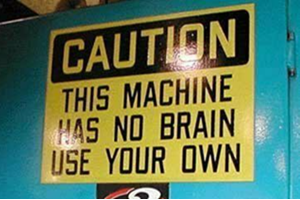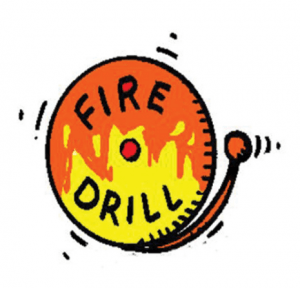Question
This week’s question is not a question. It’s a lesson from a subscriber about getting a job interview, so I’m going to highlight it differently than normal. Hope you find this real-world “how to get in the door” approach helpful. I can attest that it works because I’ve coached many successful job seekers on how to use it. It’s so fundamental and powerful a social tool that I’ve also taught employers how to apply the same basic method when they are recruiting. But let’s let this subscriber explain it! – Nick
How I got in the door
I’ve learned that Ask The Headhunter is not a road map but a philosophy that helps you take the lead in the hiring process. The job hunter who is in control does not jump in and act presumptuously. Instead, he just takes the lead, allowing others to play their parts.
The path to the job interview
Below is an actual letter that I sent to a contact at a company where I’d like to work. I got this person’s name out of the local business fish wrap.
Dear Mr. Big (alias),
I’ve been following your company’s activities. I read the XXX article in YYY fish wrap weekly. I would like to learn more and I am contacting you because you were cited in the article.
Let me explain the purpose of this letter. I am currently talking to knowledgeable professionals like you to better understand how I might fit into your industry. Managing the day-to-day operations of a technical service organization such as yours is what I do best.
I would greatly appreciate 20 minutes of your time. Let me be perfectly clear that I do not expect you to have or know of any job openings. I am strictly on an information-gathering mission, talking with people who currently work in my target industry. I assure you that I will be prepared and take up no more than the 20 minutes I asked for.
I will call you Friday morning around 8:00 AM to set up an appointment at your convenience.
How to meet who owns the jobs
I sent this letter on Tuesday, called on Friday and got an appointment for the next week! I had my meeting. This particular individual was a sales manager for the region. But, I’m not interested in getting a job in sales. I’m a technical guy. I explained to the sales guy that I wanted to talk to him because “sales has the pulse of the entire organization.” Which is true, plus, people in sales love to talk. And talk he did.
The end result is that I ended up with referrals including the names and phone numbers of two IT managers and the regional director of operations.
How to do it painlessly
I learned that the keys to getting informational meetings are:
- Ask for information only!
- Tell people up front that you don’t expect them to have or know of any job openings.
- Ask for 20 minutes.
- Tell them you’ll be prepared. Remember axiom #1 of the Ask The Headhunter approach to job search: The best way to get a job is not to ask for one.
- You will turn up the names of managers to meet with through research, not by asking HR.
Start on the periphery of your list. Don’t approach the guy you actually want to work for too early. Use the “second stringers” to get information. When you do get to your target, you’ll be totally prepared to do The New Interview.
Nick’s Reply
Good stuff! I love to see the methods we discuss put to use. I tire of people that tell me they have no contacts at a company, or don’t know whom to call, or that HR is the only way in the door.
Your method of identifying an employee to call by reading business publications is one I’ve taught in workshops. It works!
Work your way toward the job interview
Perhaps one of the most important points you make is to start on the periphery – it’s the “second stringers” who give you the ammo you need when you get to the Big Boss. (I refer to this elsewhere as triangulating to get in the door.) That’s also where you can experiment a bit with your approach and tune your presentation, and – of course – learn a whole lot!
It seems you ferreted out the phone number of the person you wrote to. When you don’t have that number, you’d of course say instead, “If you will kindly provide a number and time when we can talk for 20 minutes, I’ll call you then.”
Who can get you in the door?
Your story also points out that patience is key. The person who can get you in the door is likely someone you don’t know yet. If you did anything unusual, it’s that you invested the time to identify a relevant person in the business press.
Job hunters who are always in a hurry won’t get this: there may be no job and no match at the end of this process at this company. But even so, you will make some excellent contacts who can help you with the next company you target. There is unfortunately a strong, almost uncontrollable tendency in most people to turn that meeting into a job interview – and that’s how they blow it.
Congrats on getting in the door. Double congrats for carefully picking your quarry, both the company and the person you called. And thanks again for sharing your story.
The lesson
To other subscribers, I think this reader’s experience teaches an important lesson, in the form of a question. Who can get you into a job interview in just 20 minutes? I believe getting a shot at the best job requires that you work out the answer to that question. In fact, I think that may be the single most important task in job hunting.
How do you get in the door in today’s insane job market, which is dominated by digital roadblocks and robotic HR screeners? Have you ever started at the periphery like this reader did? How do you identify the person you need to talk to?
: :




 First, you shouldn’t worry about what any headhunter is interested in. Headhunters are involved in relatively few hires among all jobs that get filled every day. You should be focused instead on conducting your own job search and cultivating good professional contacts. Most hires come from respected sources in your field that know and recommend you.
First, you shouldn’t worry about what any headhunter is interested in. Headhunters are involved in relatively few hires among all jobs that get filled every day. You should be focused instead on conducting your own job search and cultivating good professional contacts. Most hires come from respected sources in your field that know and recommend you.
 I’m a regular reader. Most of the articles are about “How do I get a job?” How about one that talks about “How do I help someone else get a job?”
I’m a regular reader. Most of the articles are about “How do I get a job?” How about one that talks about “How do I help someone else get a job?”


 I am writing a letter of recommendation for a co-worker who is interviewing for a new job. It’s sort of a quid pro quo situation. Both he and I are somewhat unsure of how to write one, especially when doing it for a co-worker.
I am writing a letter of recommendation for a co-worker who is interviewing for a new job. It’s sort of a quid pro quo situation. Both he and I are somewhat unsure of how to write one, especially when doing it for a co-worker.

 A friend at a company I’m interested in working for referred me for a job. I have a phone interview scheduled with a “technical recruiter” later today. I asked if there was any special preparation I could do for the interview. I was told no, that we would be covering my previous experience and projects during the call.
A friend at a company I’m interested in working for referred me for a job. I have a phone interview scheduled with a “technical recruiter” later today. I asked if there was any special preparation I could do for the interview. I was told no, that we would be covering my previous experience and projects during the call. I’m a doctor running a solo medical practice. How do small businesses like mine get good managers and staff? I have two medical assistants I’m dependent on to keep work flow steady.
I’m a doctor running a solo medical practice. How do small businesses like mine get good managers and staff? I have two medical assistants I’m dependent on to keep work flow steady. My daughter worked an entry level position for a clothing chain in New York, and left to move to California. Her three managers each wanted her to stay, and said they would act as references, because she showed initiative on the job. Since she did what needed to be done instead of just what she was told to do, they wanted to keep her with the company, even if not in their store. She followed the chain’s instructions, and brought a completed application to a store that has openings in California, according to their website. Despite that, they told her they don’t have openings.
My daughter worked an entry level position for a clothing chain in New York, and left to move to California. Her three managers each wanted her to stay, and said they would act as references, because she showed initiative on the job. Since she did what needed to be done instead of just what she was told to do, they wanted to keep her with the company, even if not in their store. She followed the chain’s instructions, and brought a completed application to a store that has openings in California, according to their website. Despite that, they told her they don’t have openings.